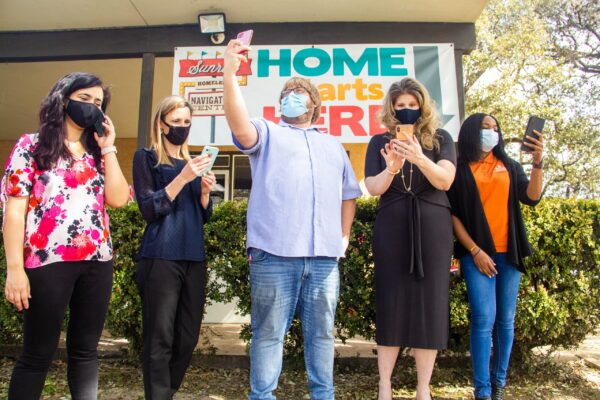AUSTIN, Texas — Combining mobile health technology, or mHealth, and community outreach to improve the health outcomes of people experiencing homelessness is the target of a new study by pharmacy researchers at The University of Texas at Austin, thanks to a five-year research grant from the U.S. Department of Health and Human Services Agency for Healthcare Research and Quality.
People experiencing homelessness are at high risk for emergency department visits and hospital use due in part to difficulty maintaining communication or lack of consistent communication between health and social services providers. The project, led by Leticia R. Moczygemba, hopes to maximize the use of a smartphone as a tool for people experiencing homelessness to take care of their health care needs, including managing their appointments and taking medications, as well as empowering individuals to use the phone to access resources and connect with community organizations for housing and employment.
The research team will work with the community partners and the Sunrise Homeless Navigation Center, housed within Sunrise Community Church in south Austin. Sunrise leadership and staff and people experiencing homelessness provided input into the design and execution of the project’s initial feasibility studies. Once the intervention is refined, 120 people experiencing homelessness in south and downtown Austin with multiple chronic conditions and medications will be enrolled in the study. Half will participate in the mHealth intervention, which includes receiving a smartphone and study text messages, and the other half will use their own phones in the usual manner.
“This is true community-engaged work,” said Moczygemba, an associate professor in the Division of Health Outcomes. “We consider Sunrise to be the ‘hub’ for this project because it is our primary recruitment site, and the case manager for the project will be integrated with the Sunrise Navigation Center.”
In addition to Moczygemba, the project team includes Mark Hilbelink, lead pastor at Sunrise Community Church and director of the Sunrise Homeless Navigation Center; co-investigators Monika Semwal, a research associate in the Division of Health Outcomes, and Carolyn Brown, a health outcomes professor and co-director of the Texas Center for Health Outcomes Research and Education; Emily Seales, the mHealth case manager; and graduate students Chinyere Okoh and James Baffoe.




